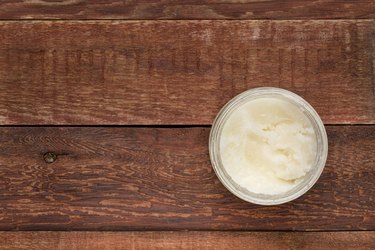
You'll find both jojoba and coconut oils in skincare products. Jojoba oil mainly is used as a skin or hair conditioning ingredient. Coconut oil is found in a variety of cosmetic products including lipstick, skin care products, shaving cream, tanning products and bath products. You also may find both of these oils or their derivatives in acne products.
Jojoba
Video of the Day
Jojoba oil is an emollient that serves as a natural moisturizing factor, or NMF. It closely resembles sebum, your skin's natural oil. NMFs support skin health by helping prevent surface irritation from penetrating deeper into your skin. NMFs also help your skin's immune and healing system and help keep bacteria out. Using an NMF helps your skin repair and regenerate itself because it lessens the impact factors that impede this process, such as excess skin irritation and dryness. Jojoba, though commonly called an "oil," is actually a liquid wax. Though more research is needed to confirm results, jojoba appears to have anti-inflammatory properties, according to a 2005 study published in "Pharmacological Research."
Video of the Day
Coconut
Coconut oil also has emollient properties for skin, though it is not classified as an NMF. Emollients help soften and soothe skin and help prevent water loss from skin. Coconut oil also appears to have biologically active components in it that speed minor wound healing, according to a 2010 study published in "Skin Pharmacology and Physiology."
Acne
Jojoba and coconut oils both fight acne, but in different ways. When jojoba oil is used in a soap or similar skincare product, it can help with acne because your glands are tricked into slowing sebum production. Coconut oil derivatives appear to have antimicrobial activity against against Propionibacterium acnes, or P. acnes, which is the bacterium that promotes acne. Lauric acid has the strongest anti-acne action, but poor water solubility makes it difficult to utilize this coconut derivative in skincare products. The best bet, therefore, is to incorporate lauric acid into a liposome formulation, according to a 2009 study published in the journal "Biomaterials."
Safety
Jojoba oil and its derivatives are safe to use as cosmetic ingredients, according to the Personal Care Products Council website CosmeticsInfo.org. You will find them in hair care products, eye make-up, nail care products, shaving products, skin care products and bath products. Coconut oil is safe as a food and as a cosmetic ingredient. Coconut oil and its derivatives are commonly used as foaming and cleansing agents, called surfactants. They're also used as stabilizers in cosmetics. The U.S. Food and Drug Administration allows coconut oil to be used as a direct food additive. It's also listed as Generally Recognized as Safe, or GRAS, by the FDA for use in cotton fabrics that are used in dry food packaging.
- Cosmetics Cop: Jojoba Oil
- “The Complete Idiot’s Guide to Making Natural Soaps”; Sally W. Trew and Zonella B. Gould; 2010
- “Pharmacological Research”: Anti-Inflammatory Effects of Jojoba Liquid Wax in Experimental Models; R.R. Habashy et al.; 2005
- “Skin Pharmacology and Physiology”: Effect of Topical Application of Virgin Coconut Oil on Skin Components and Antioxidant Status During Dermal Wound Healing in Young Rats; K.G. Nevin and T. Rajamohan; 2010
- “Biomaterials”: The Antimicrobial Activity of Liposomal Lauric Acids Against Propionibacterium Acnes; D. Yang et al.; 2009
- Cosmetics Cop: Natural Moisturizing Factor
- Cosmetics Info: Hydrogenated Jojoba Oil
- Cosmetics Info: Hydrogenated Jojoba Oil Safety Information
- Cosmetics Cop: Coconut Oil
- Cosmetics Cop: Emollient
- Cosmetics Info: Coconut Oil